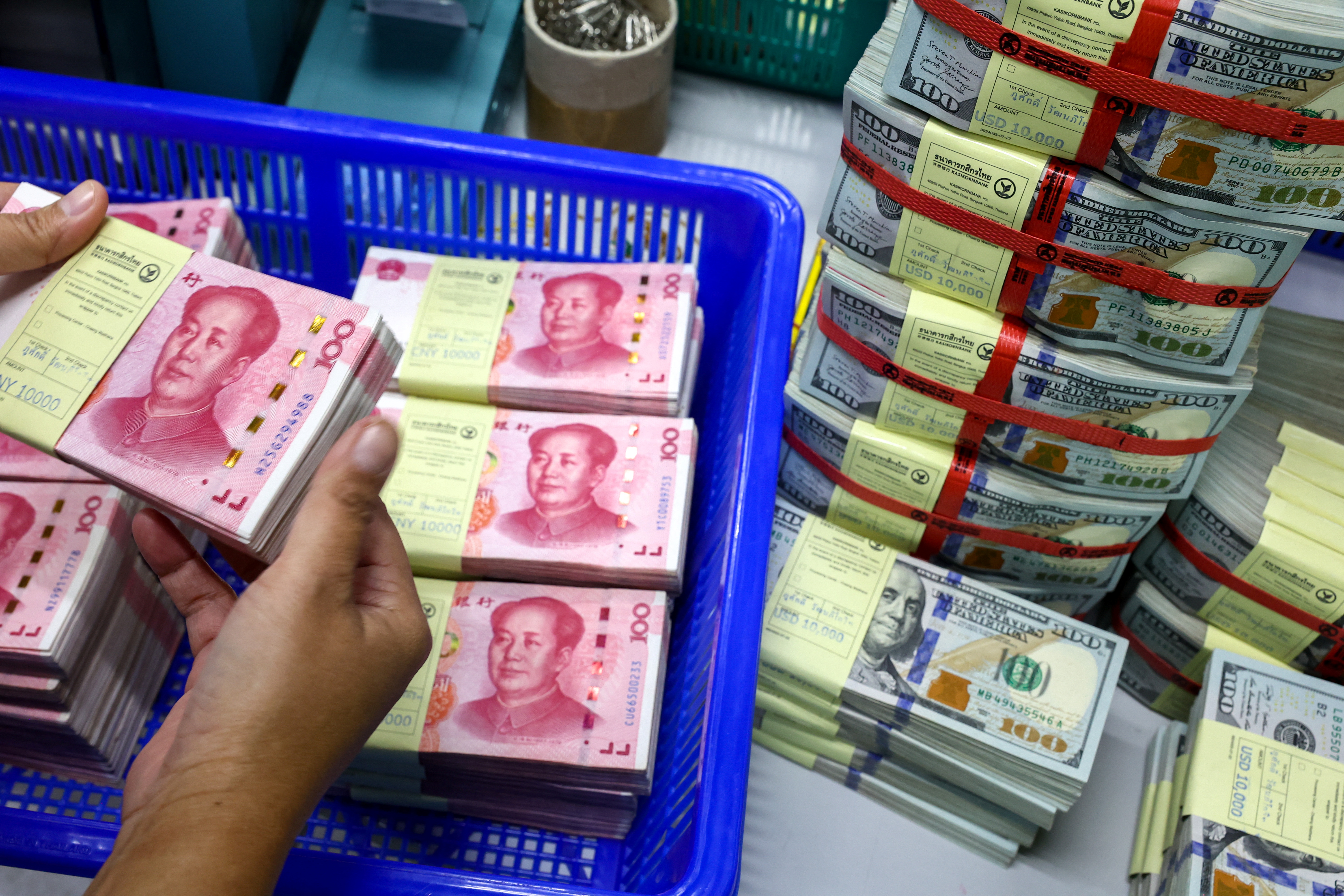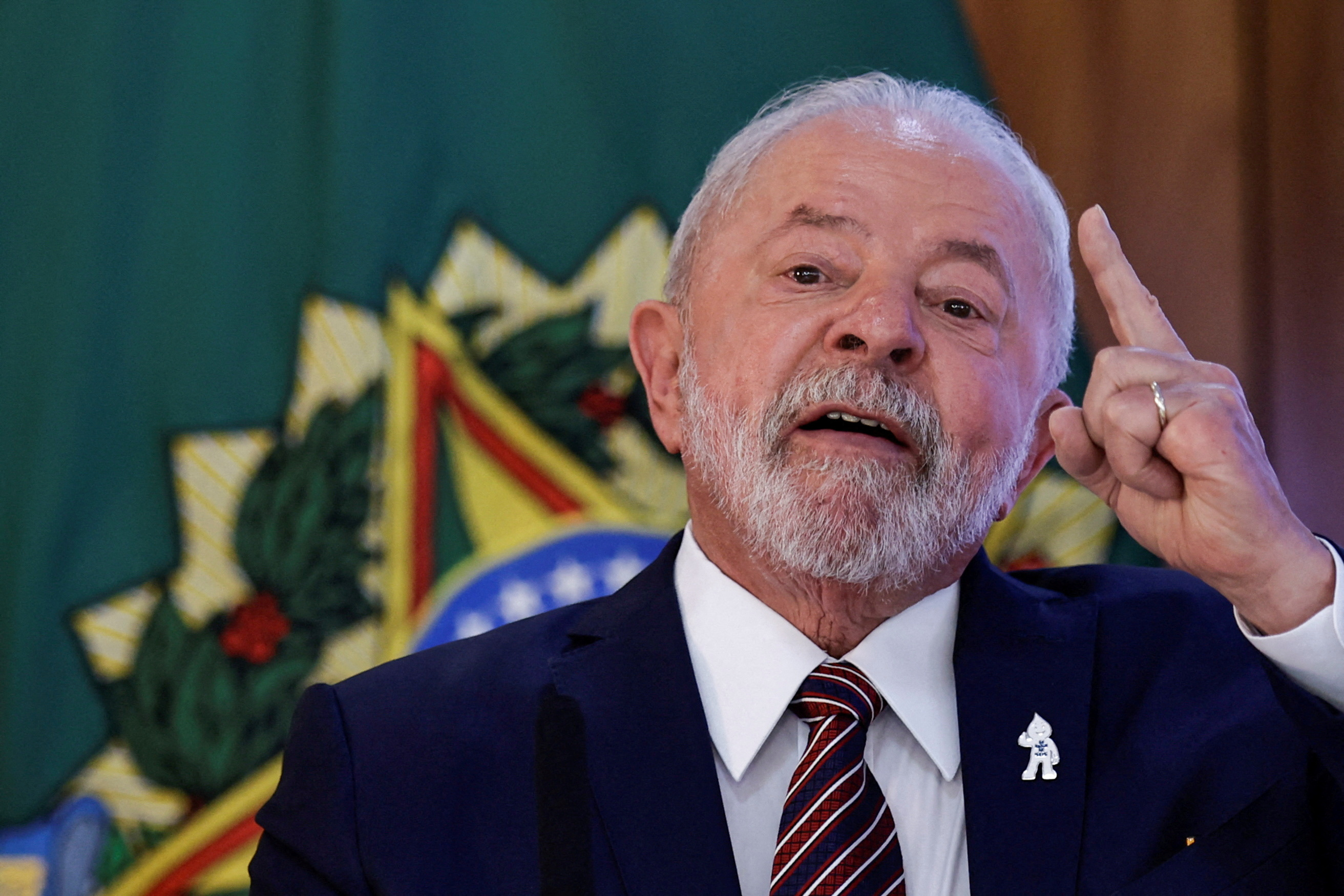
Johannesburg, South Africa – For 80 years, the United States dollar has dominated all other currencies. But a grouping of developing countries tired of the West’s looming presence over global governance and finance is determined to take it down a peg.
The process of de-dollarisation is “irreversible” and “gaining pace”, Russian President Vladimir Putin said on Tuesday in a virtual address to the BRICS summit in Johannesburg, where the leaders of Brazil, India, China and South Africa are gathered for three days.
The dollar has been the world’s principal reserve currency since the end of World War II, and is estimated to be used in more than 80 percent of international trade.
Earlier this year, Brazilian President Luiz Inacio Lula da Silva questioned why all countries had to base their trade on the dollar, and prior to that, a top Russian official suggested that the BRICS grouping was working on creating its own currency.
Calls for a global shift away from dollar dominance are not new, nor are they unique to BRICS, but experts say recent geopolitical shifts and growing tensions between the West and Russia and China have brought them to the fore.

In early 2022, Western sanctions over Russian’s invasion of Ukraine froze nearly half of Russia’s foreign currency reserves and removed major Russian banks from SWIFT, a messaging network banks use to facilitate international payments.
Later in the year, the US imposed restrictions on exports of semiconductor technology to China.
“As the US weaponises the dollar in the Russian and Iran sanctions, there is increasing desire by other developing countries to seek alternative currencies for trade, investment, and reserves, as well as developing alternative multilateral clearance systems outside of SWIFT,” Shirley Ze Yu, a senior visiting fellow at the London School of Economics, told Al Jazeera.
Yu added that as the US Federal Reserve has raised interest rates in recent years, “developing countries have widely suffered from paying higher interests on their dollar debt and battling the exchange rate impact from a strong dollar. The interest to borrow in local currencies or other currencies is strongly motivated by economic considerations”.
The impetus for Global South countries trying to find an alternative is more a “practical consideration” than a moral one, said Gustavo de Carvalho, a policy analyst on Russia-Africa ties at the South African Institute of International Affairs, as they view the recent sanctions and ask: “What are the risks that we are facing by engaging with one currency globally that may be utilised for political purposes?”
Speaking at a workshop on BRICS and the global order in Johannesburg last week, de Carvalho laid out some “very loose” options BRICS may consider, including using a basket of currencies from BRICS countries, using gold as a peg for a new potential currency, or even using cryptocurrencies.
“Each of them are quite separate and probably much more mid-to-long term than they are short term,” he said.
A BRICS currency?
Considering the possible currency options, Danny Bradlow, a professor with the Centre for Advancement of Scholarship at the University of Pretoria, said he doubts many people would want to go back to the gold standard, and cryptocurrencies are an unlikely option because they are “even more risky”.
“Which cryptocurrency would you use, which stable currency, and none of them have shown to be particularly useful in international trade,” Bradlow told Al Jazeera.
On the creation of a separate BRICS currency, experts are sceptical.
“Creating the BRICS currency will require a set of institutions,” Yu said. “Institutional creation requires a common set of standards and underpinning values. These are very difficult to achieve, although not impossible.”
Chris Weafer, an investment analyst with Macro-Advisory, a strategic consultancy that focuses on Russia and Eurasia, described the idea of a BRICS currency as a “non-starter”.
“Even people in various governments know that this is not going to happen, or not for a very, very long time,” Weafer told Al Jazeera.

Bradlow agreed.
“The idea of the BRICS creating an alternative to the dollar seems completely fanciful and unrealistic,” he said, noting the major differences between the five economies.
“If they did have a single currency uniting them, it would be dominated by the biggest and most powerful economy in the grouping, which is China, and why would smaller countries want to link their monetary policy and aspects of their fiscal policy to the Chinese economy?” Bradlow said.
“It would open up all sorts of areas of risk and constrain their freedom of action in ways that would be unacceptable to all of them.”
While talk of a possible currency has focused attention on options to replace the dollar, South Africa’s BRICS ambassador, Anil Sooklal, said the goal is less about replacing the dollar than giving the world more choices.
“BRICS is not anti-West. We are not in competition,” Sooklal told Al Jazeera. “Nor are we against the dollar. But what we are against is the continued dominance of the dollar in terms of global financial interactions.”
Weafer said that regardless of what reforms BRICS wants to implement, the grouping won’t have much room to develop if it is seen as a choice between East and West or “the West and the rest”.
“I don’t think anybody wants that,” he said.
Local currencies
In finding alternatives to the dollar, Weafer said BRICS is likely to push for the greater use of local currencies.
“We already know that 80 percent of the trade carried about between Russia and China is settled in either Russian rubles or Chinese yuan,” he said.
“Russia is also trading with India in rupees … So you’re not talking about a new currency, you’re talking about settling in the South African currency or the Russian currency.”
Even outside the core BRICS group, other countries have begun trading in local currencies. The United Arab Emirates and India last month signed an agreement enabling them to settle trade payments in rupees instead of dollars.

However, the widespread use of local currencies also brings up a new challenge: convertibility.
Weafer said that countries carrying out more trade also need to hold more of each other’s currency in reserve.
“And you have to be able to convert them into your currency,” he said.
This is difficult in India, where capital controls prevent people from taking money out of the country without permission. Once the rupee is out of India, it still needs to be converted into another currency – like the dollar – before it can be converted into the local currency of choice.
“So [there are] huge changes that have to take place; India would have to drop capital controls and then there would have to be almost an alternative to the SWIFT banking system the global system created, so as to allow the transfer of these currencies between the trade partners, avoiding global sanctions, which would currently block that,” Weafer said.
“And then each country would have to hold more of the respective trade partner’s currency.”
These changes would have to be implemented slowly and on a country-by-country basis, he said.
Bradlow said BRICS countries holding more reserves of local currencies is a “highly questionable” strategy as a reserve currency should be stable with access to liquid markets that can be moved in and out of quickly.
“The dollar is really the only currency that offers all those benefits at the moment,” he said.
Bradlow added that the question of who a country is trading with will also determine what it is willing to accept.
For example, South Africa, which does a lot of trade with China, may be keen to keep reserves of yuan, but as its other major trading partners are in the West, it will need more dollars than Brazilian reais or Russian rubles.
Dollar to remain king
For South Africa’s Sooklal and other BRICS leaders, the rationale for alternatives to the dollar is similar to that for changing the global governance architecture in general.
“We’d like to live in a multipolar society, a multipolar world,” Sooklal said.
“Trade is no longer dominated by those countries that dominated trade in the 70s, 80s, 90s – that era is over. We also want to see a multipolarity of choices, a multipolar financial world; we don’t want to be pegged to one or two currencies as the currencies of choice,” he added.
Sooklal pointed to the Pan-African payment and settlement system, a cross-border infrastructure to facilitate direct payment transactions across the continent, as a model to follow. He said it will save an estimated $5bn annually in trade transaction fees when compared with just using SWIFT.
Still, analysts say the dollar will remain king for the foreseeable future.
According to Weafer, we are still “decades” away from anything really challenging its dominance.
He said that even if the BRICS create a common currency, it may eventually work similarly to the Euro, which has not seriously challenged the dollar’s dominance.
For oil and other commodities, “the reference price is the dollar price”, Weafer said, explaining that countries using alternative currencies will still use the greenback to determine the value of what they buy and sell.







